Articles
- Page Path
- HOME > J Korean Acad Nurs > Volume 39(3); 2009 > Article
-
Original Article
- Quality of Life and Illness Intrusiveness by Type-D Personality in the Patients with Coronary Artery Disease
- Haeng-Mi Son
-
Journal of Korean Academy of Nursing 2009;39(3):349-356.
DOI: https://doi.org/10.4040/jkan.2009.39.3.349
Published online: June 29, 2009
Associate Professor, Department of Nursing, University of Ulsan, Ulsan, Korea.
- Address reprint requests to: Son, Haeng-Mi. Department of Nursing, University of Ulsan, 102 Daehak-ro, Nam-gu, Ulsan 680-749, Korea. Tel: 82-52-259-1239, Fax: 82-52-259-1236, sonhm@mail.ulsan.ac.kr
• Received: February 24, 2009 • Accepted: May 6, 2009
Copyright © 2009 Korean Society of Nursing Science
Abstract
-
Purpose
- The purpose of this study was to identify the influence of the type-D personality on quality of life and illness intrusiveness.
-
Methods
- This study was a cross-sectional study. Data were collected using self-reported questionnaire from 200 patients with coronary artery disease (CAD). Variables were measured with the Type-D Scale-14 (DS14), Korean Health Related Quality of Life Scale (KoQoLS), and the Illness Intrusiveness Rating Scale (ILRS).
-
Results
- Of the patients, 38% were classified as type-D personality. Among the 10 subcategories of quality of life, the highest mean score was bodily pain (5.84±2.85) and the lowest was role limitation (1.52±1.20). Among 13 item of illness intrusiveness, the highest mean score was health (3.78±1.73) and the lowest was family relationships (2.14±1.58). There were significant differences in all the subcategories of quality of life between type-D and non type-D except for subcategories of bodily pain and role limitation. However, there were no significant differences in illness intrusiveness between type-D and non type-D.
-
Conclusion
- Type-D is an important factor in quality of life in patients with CAD, but no correlations between type-D and illness intrusiveness were found. These results can be used as basic data for developing cardiac rehabilitation programs to improve quality of life in type-D patients.
- 1. Bhattacharyya MR, Perkins-Porras L, Whitehead DL, Steptoe A. Psychological and clinical predictors of return to work after acute coronary syndrome. European Heart Journal. 2007;28:160–165.ArticlePubMed
- 2. Denollet J. Personality and coronary heart disease: The type D scale-16 (DS16). Annals of Behavioral Medicine. 1998;20:209–215.ArticlePubMed
- 3. Denollet J. Type D personality: A potential risk factor refined. Journal of Psychosomatic Research. 2000;49:255–266.ArticlePubMed
- 4. Denollet J. DS14: Standard assessment of negative affectivity, social inhibition, and type D personality. Psychosomatic Medicine. 2005;67:89–97.ArticlePubMed
- 5. Denollet J, Pedersen SS, Vrints CJ, Conrads VM. Usefulness of type D personality in predicting five-year cardiac events above and beyond concurrent symptoms of stress in patients with coronary heart disease. The American Journal of Cardiology. 2006;97:970–973.ArticlePubMed
- 6. Denollet J, Vaes J, Brutsaert DL. Inadequate response to treatment in coronary heart disease: Adverse effects of type D personality and younger age on 5-year prognosis and quality of life. Circulation. 2000;102:630–635.ArticlePubMed
- 7. Denollet J, van Heck G. Psychological risk factors in heart disease: What type D personality is (not) about. Journal of Psychosomatic Research. 2001;51:465–468.ArticlePubMed
- 8. Devins GM. Illness intrusiveness and the psychological impact of lifestyle disruptions in chronic life-threatening disease. Advances in Renal Replacement Therapy. 1994;1:251–263.ArticlePubMed
- 9. Devins GM. Psychologically meaningful activity, illness intrusiveness, and quality of life in rheumatic diseases. Arthritis and Rheumatism. 2006;55:224–232.PubMedPMC
- 10. Devins GM, Beanlands H, Mandin H, Paul LC. Psychosocial impact of illness intrusiveness moderated by self-concept and age in end-stage renal disease. Health Psychology. 1997;16:529–538.ArticlePubMed
- 11. Devins GM, Bezjak A, Mah K, Loblaw DA, Gotowiec AP. Context moderates illness-induced lifestyle disruptions across life domains: A test of the illness intrusiveness theoretical framework in six common cancers. Psychooncology. 2006;15:221–233.ArticlePubMed
- 12. Devins GM, Binik YM, Huchinson TA, Hollomby DJ, Barre PE, Guttmann RD. The emotional impact of end-stage renal disease: Importance of patients' perceptions of intrusiveness and control. International Journal of Psychiatric Medicine. 1983;13:327–343.ArticlePDF
- 13. Devins GM, Dion R, Pelletier LG, Shapiro CM, Abbey S, Raiz LR, et al. Structure of lifestyle disruptions in chronic disease: A confirmatory factor analysis of the illness intrusiveness ratings scale. Medical Care. 2001;39:1097–1104.ArticlePubMed
- 14. Devins G, Edworthy SM. Illness intrusiveness explains race-related quality-of-life differences among women with systemic lupus erythematosus. Lupus. 2000;9:534–541.ArticlePubMedPDF
- 15. Ferrance CE, Powers MJ. Quality of life index: Development and psychometric properties. Advances in Nursing Science. 1985;8:15–21.ArticlePubMed
- 16. Franche RL, Abbey S, Irvine J, Shnek ZM, Grace SL, Devins GM, et al. Sex differences in predictors of illness intrusiveness 1 year after a cardiac event. Journal of Psychosomatic Research. 2004;56:125–132.ArticlePubMed
- 17. Karlsson MR, Edström-Plüss C, Held C, Henriksson P, Billing E, Wallén NH. Effects of expanded cardiac rehabilitation on psychosocial status in coronary artery disease with focus on type D characteristics. Journal of Behavioral Medicine. 2007;30:253–261.ArticlePubMedPDF
- 18. Pedersen SS, Denollet J. Type D personality, cardiac events, and impaired quality of life: A review. European Journal of Cardiovascular Prevention and Rehabilitation. 2003;10:241–248.ArticlePubMed
- 19. Pedersen SS, Denollet J. Validity of the type D personality construct in Danish post-MI patients and healthy controls. Journal of Psychosomatic Research. 2004;57:265–272.ArticlePubMed
- 20. Pedersen SS, Holkamp PG, Caliskan K, van Domburg RT, Erdman RA, Balk AH. Type D personality is associated with impaired health-related quality of life 7 years following heart transplantation. Journal of Psychosomatic Research. 2006;61:791–795.ArticlePubMed
- 21. Pedersen SS, Middel B. Increased vital exhaustion among type-D patients with ischemic heart disease. Journal of Psychosomatic Research. 2001;51:443–449.ArticlePubMed
- 22. Pelle AJ, Erdman RA, van Domburg RT, Spiering M, Kazemier M, Pedersen SS. Type D patients report poorer health status prior to and after cardiac rehabilitation compared to non-typed D patient. Annals of Behavioral Medicine. 2008;36:167–175.PubMed
- 23. Pelle AJ, Schiffer AA, Smith OR, Widdershoven JW, Denollet J. Inadequate consultation behavior modulates the relationship between type D personality and impaired health status in chronic heart failure. International Journal of Cardiology. 2009;1–7. doi:10.1016/j.ijcard.2008.12.086.
- 24. Razzini C, Bianchi F, Leo R, Fortuna E, Siracusano A, Romeo F. Correlations between personality factors and coronary artery disease: From type A behaviour pattern to type D personality. Journal of Cardiovascular Medicine. 2008;9:761–768.ArticlePubMed
- 25. Shim JY, Lee JK, Kim SY, Won JW, Sunwoo W, Park HK, et al. The development of Korean health related quality of life scale. Journal of Korean Academy of Family Medicine. 1999;20:1197–1208.
- 26. Son HM. The relationships of illness intrusiveness and quality of life in chronic liver disease patients. Journal of Korean Academy of Adult Nursing. 2002;14:501–509.
- 27. Son HM. Verification for the validity and reliability of the type D scale-14. Journal of Korean Academy of Fundamentals of Nursing. 2008;15:312–320.
- 28. Song EK, Son YJ. The analysis of type D personality research as a psychosocial risk factor in cardiovascular disease for elders with a chronic disease. Journal of Korean Academy of Nursing. 2008;38:19–28.ArticlePubMed
- 29. Song KJ. The effects of self-efficacy promoting cardiac rehabilitation program on self-efficacy, health behavior, and quality of life. 2001;Seoul, Seoul National University. Unpublished doctoral dissertation.
- 30. Willams L, O'Connor RC, Howard S, Hughes BM, Johnston DW, Hay JL, et al. Type-D personality mechanism of effect: The role of health-related behavior and social support. Journal of Psychosomatic Research. 2008;64:63–69.ArticlePubMed
REFERENCES
Figure & Data
REFERENCES
Citations
Citations to this article as recorded by 

- A Concept Analysis of Illness Intrusiveness in Chronic Disease: Application of the Hybrid Model Method
Youngjoo Do, Minjeong Seo
International Journal of Environmental Research and Public Health.2022; 19(10): 5900. CrossRef - Effect of Type D Personality on Short-Term Cardiac Rehabilitation in Patients With Coronary Artery Disease
Sang Jae Lee, Sunghoon Koh, Byung Ok Kim, Bongseog Kim, Chul Kim
Annals of Rehabilitation Medicine.2018; 42(5): 748. CrossRef - Influencing Effects of Type D Personality on Symptom Experiences and Quality of Life in Patients with Percutaneous Coronary Intervention
Eun Hee Jo, Sun Hee Han, Myung Ha Lee, Sung Reul Kim
Korean Journal of Adult Nursing.2016; 28(5): 536. CrossRef - Mental Health and Quality of Life by Type-D Personality of the Patients with Coronary Artery Disease
KyeongSook Cha, SuMi Im, Ok-Hee Cho
The Journal of the Korea Contents Association.2013; 13(5): 286. CrossRef - Factors Influencing Illness Intrusiveness of the Sexual Life in Women with Overactive Bladder
Jeong Lim Cho, Eun Nam Lee
Journal of muscle and joint health.2013; 20(1): 62. CrossRef - The effectiveness of an educational intervention on proper analgesic use for dysmenorrhea
Hyun-Suk Jung, Jungkwon Lee
European Journal of Obstetrics & Gynecology and Reproductive Biology.2013; 170(2): 480. CrossRef - Type D personality and health status in cardiovascular disease populations: a meta-analysis of prospective studies
Henneke Versteeg, Viola Spek, Susanne S Pedersen, Johan Denollet
European Journal of Preventive Cardiology.2012; 19(6): 1373. CrossRef - A Comparison of the Health Status and Health Promoting Behaviors between Type D Personality and Non-Type D Personality in Middle aged Women
Sun Hyoung Bae, Jin-Hee Park, Euigeum Oh
Korean Journal of Women Health Nursing.2011; 17(4): 337. CrossRef - Effect of stress on the development of arterial hypertension
І. І. Knyazkova, N. V. Kuzmіnova, N. Yu. Osovska, M. V. Bogun, S. V. Vernygorodskyi
Likarska sprava.1970; (5-6): 41. CrossRef
Quality of Life and Illness Intrusiveness by Type-D Personality in the Patients with Coronary Artery Disease
Quality of Life and Illness Intrusiveness by Type-D Personality in the Patients with Coronary Artery Disease
General Characteristics (N=200)
Classification of Type D Personality (N=200)
Scores of Quality of Life and Illness Intrusiveness (N=200)
Differences in Quality of Life by Type D Personality (N=200)
Differences in Illness Intrusiveness by Type D Personality (N=200)
Table 1
General Characteristics (N=200)
Table 2
Classification of Type D Personality (N=200)
Table 3
Scores of Quality of Life and Illness Intrusiveness (N=200)
Table 4
Differences in Quality of Life by Type D Personality (N=200)
Table 5
Differences in Illness Intrusiveness by Type D Personality (N=200)
 KSNS
KSNS
 E-SUBMISSION
E-SUBMISSION
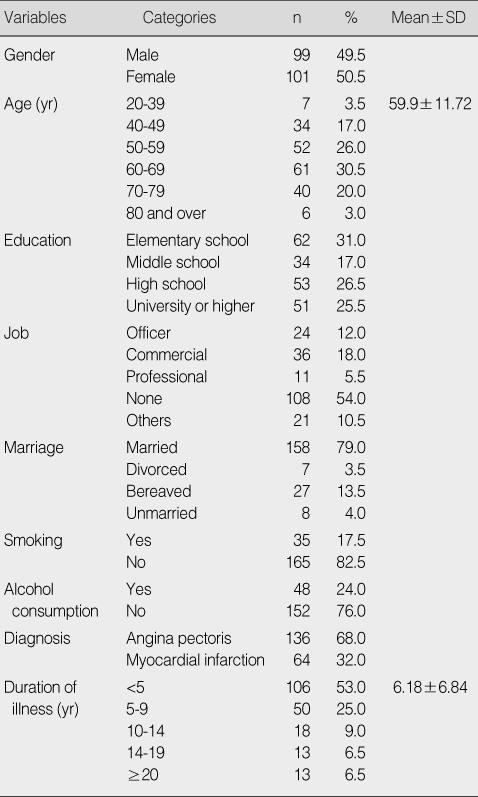
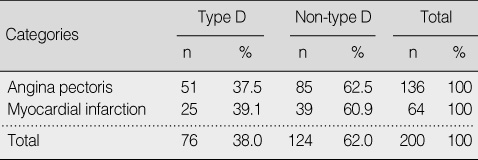
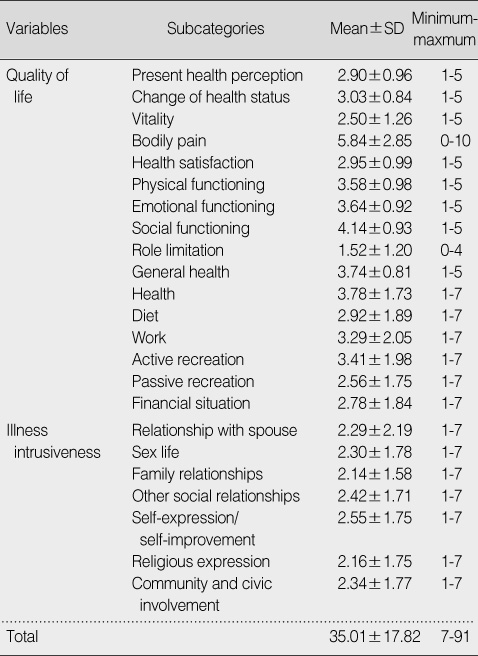
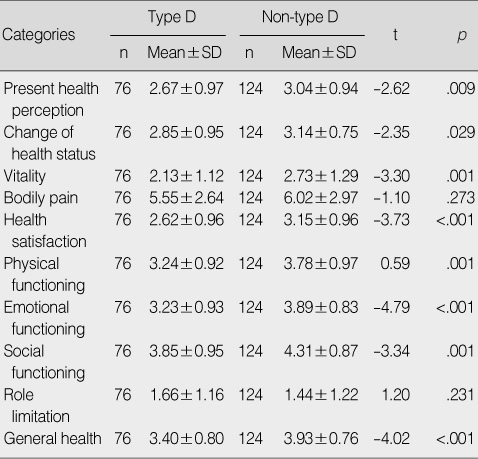
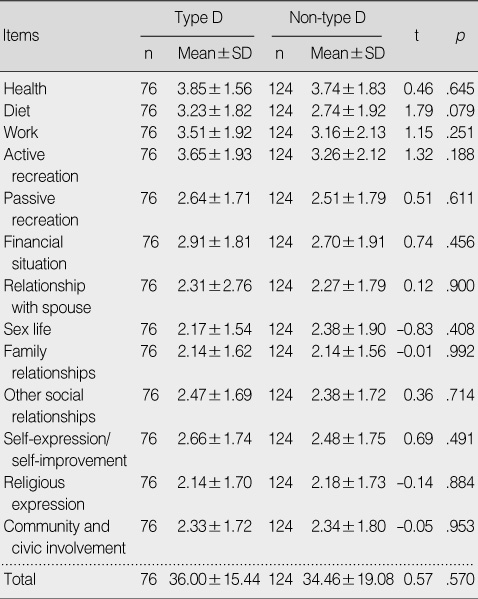
 Cite
Cite

